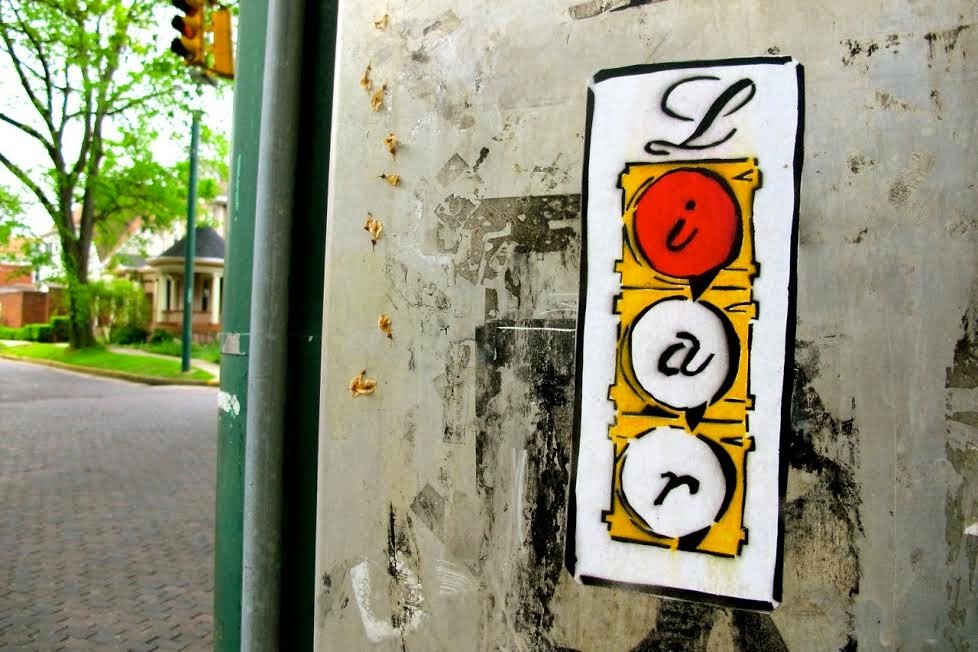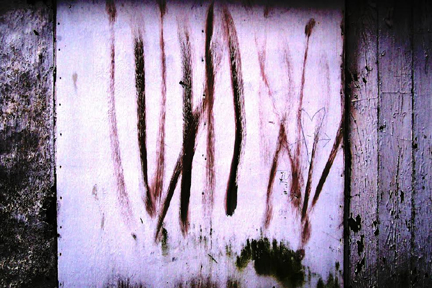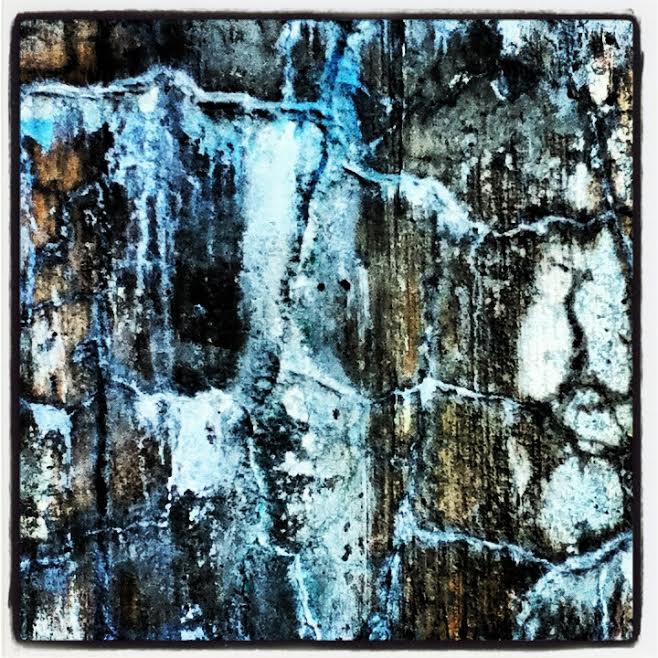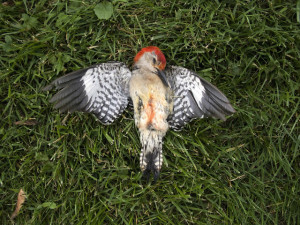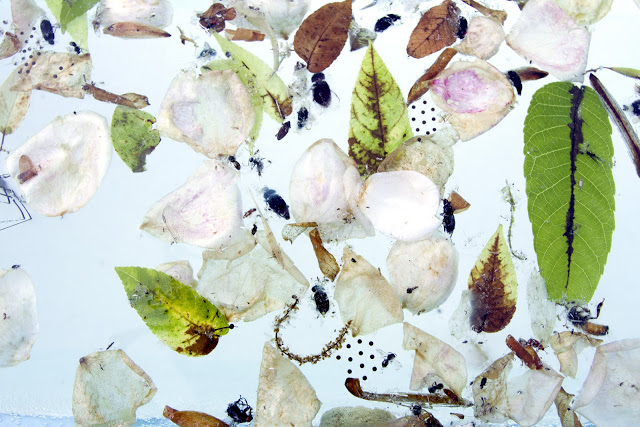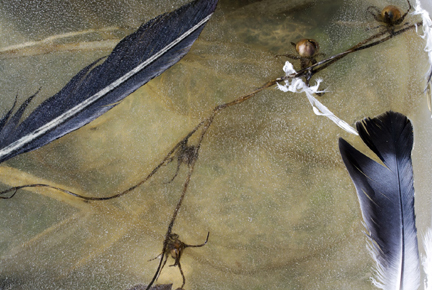
Frozen Feathers, image by Karen Bell
She had been sleeping, it seemed, then she heard someone cough. Who is coughing? she thought. Then she realized: it was herself.
Silly old woman. Silly half-dead old woman.
Then she noticed that she was sitting up. Why? She looked around the hospital room. The vaporizer breathing the menthol odor of death. The late afternoon light on the linoleum like the outline of someone killed in a highway accident.
Anastasia shivered. Why did she have to think such thoughts? This was no time to think like that. This was a time for joy.
She lay back into herself, hugged the chill inside her. It wouldn’t be long now.
Now what was that? Nurses talking in the hallway? She raised her head from the pillow and strained to hear what they were saying. But she couldn’t make out the words over the hiss of the vaporizer, so she lay back.
Then it wasn’t nurses talking. It was cicadas buzzing in the trees around her father’s farm.
She’d heard that ratcheting hum every August when she was growing up. Once, she and Tom collected the brittle, umber-colored husks left in the elms after the humming stopped. She stood under each tree holding one of their father’s empty cigar boxes while Tom shinnied up and found the desiccated husks. At first he crushed a lot of them, they were so fragile; later, he learned how to cradle them in his palm.
She had that cigar box full of them somewhere. Where?
And who was this?
The nurse’s face hung before her like a question waiting to be answered. “Sister Anastasia? Are you awake?”
Why did nurses wear white, nuns black?
“You have a visitor, Sister.”
Hovering beside her in the half-light: Sister Beatrice. The children are right. We do look like blackbirds. She watched Beatrice pull a white handkerchief out of her black sleeve and blow her nose. The old nun laughed, then coughed. She hugged her ribs until she stopped coughing.
Was this how Tom had felt? Dry and ready to crumble?
“Sister Anastasia?”
It was that big-nosed nurse again. What do you want now?
“It’s time for your afternoon chest rub, but I’ll wait till you’re through visiting. Whenever you’re done, just buzz for me, okay?”
He would drop down from the tree with his hands full of husks.
“I’m dying,” she said, but Tom was gone.
“Pardon me?” a voice said. “Did you say something, Sister?”
Anastasia turned to the voice’s face: it was Sister Beatrice. Then she laughed. A blackbird with wire-rimmed glasses. She had to tell the children.
The children—she had almost forgotten the children. How they would suffer when they heard she was dead! She remembered how hard they had cried last spring, when the touring company of the Black Hills Passion Play performed the crucifixion at their school, and she imagined them at her funeral: the boys, bravely blinking, and the girls, their faces in their hands.
What was she thinking of? How could she think such a thing?
“I am an old sinner,” she whispered. “Forgive me.”
“For what?” Beatrice asked. “You’ve never done anything to hurt me. You know that.”
Anastasia looked at the young nun. She was about to explain, but the coughing started again. When it was over, Anastasia was sitting up. Beatrice helped her lie back.
“Are you all right?” Beatrice worried.
“I need a priest,” Anastasia said. She’d been asking for Last Rites for two days, but all she’d received were more pain pills. “Call Father Switzer. Please.”
“Don’t you talk like that,” Beatrice scolded. “Dr. Gaertner says you’ll be fine in a week or so. You’re going to be under the weather awhile, but what do you expect when you don’t wear your shawl when you should? You can’t say we didn’t warn you—and time and again.”
Anastasia smiled at her stern look. No wonder her children ignored her when she disciplined them: no matter how hard she tried, she couldn’t look angry, not with that baby face.
Then Beatrice’s chin began to quiver and the stern look dissolved. Taking out her handkerchief, she turned away. “I’m sorry, Sister,” she said. “I shouldn’t cry; there’s nothing to cry about.” Then she began to cry even harder. She turned back to Anastasia. “Oh, Sister, I hate to see you so sick!” she sobbed, and threw her arms around her.
Beatrice’s wide wimple blocked the last bit of light from the hospital window, and Anastasia felt the darkness settling around her. She had been waiting for it, and it had finally come. She breathed it in, felt it fill her hollow cheeks and lungs.
But Beatrice rose, wiping her tears, and the light came back.
“I’m not supposed to tell you this,” she said, “but I will. We’re planning a big birthday party for you when you get back. We’re going to decorate the lunchroom with balloons and crepe paper and signs, and the kids are going to sing ‘Happy Birthday,’ and then we’re going to have cake and ice cream and play some games. Sister Rose is going to bake a huge cake, and I’m going to decorate it. I had the best idea ever: I’m going to spell out your name with candles! Can’t you just imagine how beautiful it’ll look when all the candles are lit?”
If a candle was still burning after you tried to blow it out, that meant you had a secret boyfriend. And if the stem of your apple snapped on the third twist, that meant his name began with C.
A young man was once in love with me, Anastasia said. Or did she? Sister Beatrice did not seem to hear. “I know I shouldn’t have told you,” Beatrice was saying. “It was supposed to be a surprise and everything, but I just wanted you to know how much we care about you.”
She shouldn’t be thinking about Carl now: she didn’t want to spoil her death with thoughts of old boyfriends. She was a nun, not a housewife. But everyone else who knew her when she was young was dead: Tom was dead, Mother and Father, her friends. Everyone. Carl was the only one left who would remember what she was like when she was a little girl.
Why did that matter?
The fall from innocence was fortunate; it was sinful to regret it. Adam and Eve banished to Heaven. The discarded apple making cider in its bruises.
What now?
Beatrice was patting her hand. Nice puppy.
“All the kids miss you terribly, and so do we,” she said. “I know Antoinette Marie is short-tempered with you sometimes, but she doesn’t mean anything by it, and she misses you as much as Camilla and Rose and I do. And Father Switzer—you know you’ve always been his favorite. Just this morning he said he can’t wait to see your smiling face again.”
Anastasia thought she heard Father Switzer’s lisping Latin. She rose to her elbows. He’s finally here. It’s finally time. She looked around the room for his shock of blond hair and boyish face.
But it was only the vaporizer, hissing its dark litany. What a foolish woman! Anastasia lay back into a laugh. She knew she’d start coughing again, but she didn’t care. It was too funny. She was too funny.
“What is it?” Beatrice asked.
Anastasia crossed her hands at her neck, trying to strangle the cough before it began. But it began anyway, and she coughed until she was dizzy, until green and gold burned neon under her eyelids.
She thought: so much pain. But what was this compared to the agony in the garden, the sweating of blood, the scourging, the crowning with thorns, the crucifixion and death? No, it was wrong to complain about a little cough. Her suffering was meaningless. She wished she could cough blood, to make herself more worthy of death.
“Are you feeling all right now?” Beatrice said. She was wiping the old nun’s face with a hand towel.
Anastasia couldn’t speak for a moment, and when she did, the words seemed heavy, as if she had to draw them up from deep in her lungs. “I don’t know how to die,” she said.
“You’re not going to die, Sister. You’re just sick and overtired, that’s all. You’ll be back to normal in no time.”
The laity at least had the luxury of making wills, disposing of property. But she had nothing to will, she had given everything, even her will, away. Be it done unto me according to Thy word. All these years she had been exhilarated by that surrender, and her subsequent nothingness, but now she was frightened. She remembered the afternoon Tom lowered her into Grandpa Emery’s dry well so she could see the stars: only from the vantage point of darkness could you see the light buried within the light. And she had married the darkness, worn its black habit, so she could be reborn into that light. But what if she had not really surrendered but only given up?
After Tom died, she was the dead one. His absence was so complete it was presence, but no one noticed her, the true ghost. Father sat on the porch rocker, smoking and staring into the night, never saying anything about him or even mentioning his name. But Mother couldn’t talk about anything else. She’d sit in the kitchen and talk for hours with Mrs. Willoughby about him. He was born to be a priest, she’d say. When he was little, he’d pin a dishtowel around his neck like a chasuble and pretend to celebrate Mass, distributing cookies to the neighbor children as if they were Hosts. And he was always praying. Sometimes he’d even talk to his guardian angel as if he could really see him.
How could she tell her parents she too was no longer of this world? Something had died in her when Tom had died, but something had been born, too. A vocation. She stood in front of her bedroom mirror and practiced her announcement for days before she finally told them.
“You must be cold, Sister. Your lips look a little blue. Do you want me to get you another blanket?”
Tom had not been afraid of death and neither was she. But she was almost ashamed to die. Tom was so young, he might not even recognize her. He had been only seventeen when he died. A year later, her first in the convent, she was seventeen too, and all that year she had cherished the thought that they were twins, in a way. But now she was old enough to be his grandmother.
“Why, you are cold. And it’s so warm in here!”
Just then a cough caught in her larynx, choking her. She opened her mouth and gulped, but there was no air. She gulped until her ears rang, until air no longer mattered, and then she lay quietly, watching Beatrice’s white hands flutter about her wimple.
What was that silly girl so excited about?
Then Beatrice lifted her up and her breath came back in sobs. Each swallow of saliva scalded her throat.
“Oh, Sister, are you all right?”
She had almost touched bottom that time. She had come so close, so very close, and Beatrice had ruined it.
Beatrice’s lip was quivering now. “I hate to see you like this,” she said. “You mean so much to me . . .”
Anastasia lay back. I want to die now. Why won’t you leave me alone?
“You’ve been like a mother to me. I don’t know what—”
“I’m just an old nun,” Anastasia snapped. “I’m not your mother.”
“What’s wrong?” Beatrice asked. “Did I say something wrong? I didn’t mean—”
“Why don’t you just go away? Can’t you see I’m tired?”
Beatrice took out her handkerchief again. Tears, tears. Won’t she ever stop?
“I’m sorry, Sister, it’s just that I love you.”
“What do you know about love?” Anastasia said. And she remembered how once, when they were playing Statues, Carl kissed her to make her come alive, and she fell giggling into grass so green it shone. But that was before, that was when they were still children. Years later, he took her for a buggy ride behind her father’s big chestnut mare and, stopping in the woods, kissed her twice before she could say a word. All the way home, the wind lifted the pale underbellies of poplar leaves, and the woods purred.
But the last time she let him kiss her was the Sunday before Tom died. It had rained while they were in church that morning, and the hay in the loft smelled pungent and musty. It was the smell of loam, of a freshly dug grave, and each time Carl kissed her, he drove her deeper into the hay, deeper into the smell, until she couldn’t breathe. She thought of Tom lying in his hospital bed, and asked God to take her instead of him. He was the good one, the holy one: he should live, not her. All the while Carl kissed her, she prayed for her death. She let him kiss her a long time, until he began to moan with the desire to do more. His moans confused her: they sounded like Tom’s, though they came from pleasure instead of pain. That didn’t make sense to her. But nothing made sense to her anymore, except her desire to die in Tom’s place.
After Carl left, she went to her room and waited for her parents to come home from the hospital. By the time they returned, she had a fever, but she did not tell them: it was her secret, her private miracle. She wept herself to sleep, imagining her funeral. But the next day her fever was gone, and four days after that, Tom was dead.
Beatrice was drying her eyes again. “I don’t understand,” she said. “You’ve always said you loved me like a daughter. So why can’t I say you’ve been like a mother to me?”
Later she went to the loft alone and lay in the one window’s shaft of sun, sweating in the prickly hay. Dervishes of dust spun in the stained light, descending on her with an almost suffocating weight. She had never realized how omnipresent, nor how active, the dust was.
“Maybe you wish I didn’t love you,” Beatrice sniffled. “But I do, and I always will.”
Anastasia looked at her. She was young and pretty, her whole life ahead of her. She’d never pray to die in her place. She’d never beg God to let her lie on this bed, her skin wrinkled and liver-spotted, her lungs congested with pneumonia, her heart running down like a clock.
“No, you don’t,” she said.
“Why are you saying these things to me? You know I love you.”
Anastasia tried to answer, but she couldn’t. Where was her breath? She tried to cough, to open her lungs, but the noiseless spasms only made her throat hurt. It ached the way it did when her children knelt at the communion rail for the first time and stuck out their tongues for the Host. There was a throb at the root of her tongue, a desire. But for what?
Then she coughed so hard that something seemed to snap in her chest. A knot of phlegm humped onto her tongue. It tasted like rust.
Beatrice’s face wavered in front of her, stippled with sweat. “Please be all right, Sister. Please.”
Anastasia spat onto the bedspread and turned to the wall.
At the wake, old ladies dressed in black hovered in the vestibule like crows. They hugged her and said they were so very sorry, Tom was such a fine young man, he would have made a wonderful priest. Their mouths were crumbling, their yellow skin smelled like sour milk.
“I’m sick of your sympathy,” Anastasia said. She closed her eyes. “I’m sick of you.”
“How can you say such a thing?” Beatrice said. She was wadding Kleenex to wipe up the mucous. “Try to think how I feel.” And then her thin-glass voice broke: “What have I done?”
If he had lived until his ordination, he would have been buried in complete vestments—cassock, surplice, amice, alb, maniple, chasuble, and stole. Not a black blazer and bowtie.
“Why are you so angry at me?”
It had to be a mannequin in the casket; it couldn’t be Tom. It had to be a mannequin wearing Tom’s clothes.
“His skin looked like plastic, but I kissed him anyway,” Anastasia said.
Beatrice stopped. “What did you say?”
Anastasia refused to believe the diagnosis. The doctors can’t be right. He doesn’t look sick at all. See how big and strong he is?
But in his marrow, a blizzard of white blood cells.
“Please tell me what’s wrong.”
A hand on her shoulder. Anastasia looked up. Beatrice again: her face fish-belly white.
The old nun turned over onto her back. “Leukemia,” she explained.
Beatrice put her hand to her forehead. It shook as she rubbed her eyebrows with her thumb and forefinger. “No, Sister, you don’t have leukemia,” she said. Then: “I think we’d better call the doctor.”
“Just let me die,” Anastasia said. And then her phlegm-clotted lungs closed up. But this time she did not struggle for air. This time she closed her lips into a thin smile.
Her lungs were gray cocoons about to burst. Inside, the soul’s wings beating.
My Lord, my Lord, take me for Thy most humble bride!
Beatrice clutched her handkerchief as if it were holding her up. “Oh, Sister!” she cried, and hurried out of the room, her habit scything the last light.
This was it. This was what she had been waiting for all these years, the end of all that passion and memory. She had no fear of dying. She was a bride of Christ: death was her dowry, nothing more.
All day she had been travelling backward, a flower folding back into its bud. For years she had thought only occasionally about Tom and Carl, but today she had returned to that age when she thought about them daily. And now she was almost back to her birth.
Tom: the husks of cicadas’ songs in his hands. A touch could shatter them to shards. Oh, what music the soul must make as it shucks the body!
All she had to do was shut her eyes and the earth would close over her, and she would be lost, perfectly lost. She did not need Father Switzer or Carl or anybody. She laid her hands palms-up at her sides and waited for the last ecstatic moment. Then the dark began to murmur as if it had silt in its throat. She closed her eyes. What joy! she thought. And she sank into the darkness until the whining of the winch stopped and Tom’s head appeared over the ledge. “Didn’t I tell you?” he shouted down the well. “You can see them, can’t you?” But she didn’t answer, couldn’t answer. She just clung to the rope and swung there in the darkness, staring up at Tom, his hair blond as an angel’s, and beyond him, the stars in the noonday sky.
Father Switzer drove down the exit ramp of the hospital parking lot, paid the middle-aged woman in the booth, and turned out onto the boulevard.
“The painters just finished today,” he continued. “I think they did a bang-up job. They’ve changed the whole atmosphere of the lunchroom. You wouldn’t believe the difference.” Then, as if he’d just thought of it, he added, “Say, why don’t we swing by the lunchroom before I take you back to the convent? That way you can see for yourself how nice it looks.”
Anastasia noticed a smile starting around the corner of his mouth. The smirk of a boy who tells a lie that is technically true. The pleasure of sin without the guilt.
“It’ll only take a minute,” he persisted.
She looked out the window of the station wagon. The houses they were passing were among the oldest in the city, but none of them had been built before she was born. Some of them had For Sale signs stuck in their brown lawns. She thought of the children in their art smocks, painting signs for her birthday party. She couldn’t say no, but neither could she say yes.
“How could we afford to paint the lunchroom?” she asked wearily.
But he was ready for that question. “Some of the parishioners volunteered to do the painting, so it cost us almost nothing,” he answered.
She knew he was grinning now. She continued to look out the window. I will do it for the children, she thought. For the children and Beatrice.
But when Father Switzer wheeled her into the lunchroom and she saw the balloons dangling from the undulating rows of crepe paper streamers, the banners that read HAPPY BIRTHDAY!, WELCOME BACK, SISTER ANASTASIA!, and WE MISSED YOU!, the tables set with pink and yellow paper cups and plates, and the children in their party hats leaping up from their chairs shouting, “Surprise!” and twirling noisemakers, she could not act surprised or happy. She tried to clap her hands to her face in a dumb show of shock, but they stopped halfway and fell back into her lap like broken-winged birds.
Rose and Antoinette Marie welcomed her back. Camilla took her hand and pressed it softly between hers.
But where was Beatrice? Anastasia looked around the room and found her standing by the far table, pretending to be supervising her third- and fourth-graders. She put her finger to her lips unnecessarily.
Just then, Father Switzer raised his hands in a pontifical gesture. “Quiet down, children, quiet down.” The students sat back in their seats heavily. Father Switzer waited until the chairs quit squeaking, then looked at Anastasia and winked. “Didn’t I tell you the painters did a great job? Just look at these signs. The boys and girls spent half the day painting them. Not to mention blowing up balloons and hanging crepe paper and whatnot. And Sister Rose has baked a gigantic cake.”
At this, one of the boys let out a whoop. Antoinette Marie rolled her sleeves up her plump red forearms and frowned in a parody of discipline.
Father Switzer was getting serious now. He had his hand on Anastasia’s shoulder. “I wouldn’t be telling the truth, Sister, if I didn’t say we were all pretty worried about you. We spent a lot of time on our knees, especially after you had your close call.”
Anastasia closed her eyes. The reflector on the intern’s forehead had shone like the eye of a monstrance. She’d heard Beatrice say, “Is she breathing?” and then the oxygen mask descended over her nose and mouth like a new, unwanted face. A horrible face. She tried to push it away, but it fit too tightly. And now the face was hers, though no one else could see it. She opened her eyes and saw that Beatrice was watching her. She tried to smile, but Beatrice looked away.
Could Beatrice see it too?
“But God heard our prayers,” Father Switzer was saying, “and now you’re back with us and we can finally celebrate your birthday. I know we’re a few days late, but we hadn’t counted on your illness. In any case, we intend to make up for lateness with style.” Father Switzer grinned and nodded at Antoinette Marie. “Ready, Sister?”
Antoinette Marie produced a pitch pipe from her pocket and hummed the key of C. Then, flourishing her arms and vigorously mouthing the words, she led everyone through two choruses of “Happy Birthday.” When they were through, some of the children jumped up and swarmed around Anastasia’s wheelchair. “I’m so glad you’re not sick anymore,” a skinny blue-eyed girl said. “Me too,” said the boy standing next to her.
Anastasia looked from one face to another. She couldn’t remember who they were. She had been away for only three weeks and already she had forgotten their names.
“I’m happy to be back,” she managed.
Beatrice stepped into the circle of children. “Let’s not tire Sister Anastasia, children. She shouldn’t have too much excitement right away.” She turned her wrinkled brow to Camilla. “Perhaps we should have the cake sooner than we’d planned.”
Camilla looked at Anastasia. “All right,” she said. Then she turned to the children. “Let’s bring out the cake and ice cream!”
“Yay!” cried the children.
“Take your seats,” Father Switzer ordered, and the children scrambled into their places. Antoinette Marie and Rose disappeared into the kitchen.
“Are you all right?” Camilla asked Anastasia. “You don’t seem yourself.”
“I think she’s overcome with surprise,” Beatrice answered for her.
The children cheered then, for Sister Rose had just emerged from the kitchen, carrying an enormous sheet cake. Antoinette Marie followed her out the double doors, pushing a cartload of vanilla Dixie cups and tiny wooden spoons.
“Stay in your seats, children,” Father Switzer commanded. “Sister Rose, the first slice is for our guest of honor.”
They set the cake on the table in front of Anastasia. There was only one candle on the cake, stuck in the middle of waves of chocolate frosting. Rose struck a match and lit it.
Anastasia looked at Beatrice. “Where are all the candles?” she said.
“We wanted to save your breath,” Beatrice answered, and looked away.
“Come on, Sister!” some boys shouted. “Make a wish and blow it out.”
The old nun stared at the candle. The cake was so big, the candle so small. In the dark frosting, the flame’s reflection flickered, a dying star.
“Come on, Sister!”
Anastasia clasped her shawl tighter around her neck and leaned forward in the wheelchair. For a moment, everyone was silent. She felt them all watching her, waiting for her to blow out the candle, and she closed her eyes. Behind her eyelids, the darkness was private and peaceful, a refuge, and she wished everything were so dark that no one could see her, not Father Switzer or the children or even Beatrice. She wished she were invisible, there but not there, a darkness inside the darkness, like Tom, like God.
“Sister?” Father Switzer said.
With an effort, she opened her eyes and looked at the candle’s puny light.
“Have you made your wish?” he asked.
She nodded. Then she took a deep breath and blew the flame out.
David Jauss is the author of the short story collections Glossolalia: New & Selected Stories, Black Maps and Crimes of Passion, and two collections of poems, You Are Not Here and Improvising Rivers, as well as a collection of essays, On Writing Fiction. His short stories have been published in numerous magazines and reprinted in such anthologies as Best American Short Stories, The O. Henry Awards: Prize Stories, and, twice in The Pushcart Prize: Best of the Small Presses. He is the recipient of a National Endowment for the Arts Fellowship, a James A. Michener Fellowship, three fellowships from the Arkansas Arts Council, and one from the Minnesota State Arts Board. His collection Black Maps received the Associated Writers and Writing Programs Award for Short Fiction. He teaches creative writing at the University of Arkansas at Little Rock and in the low-residency MFA in Writing Program at Vermont College of Fine Arts.
Read an interview with David here.

